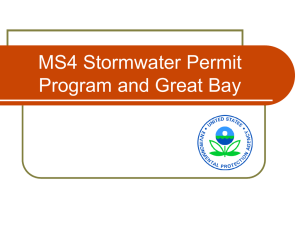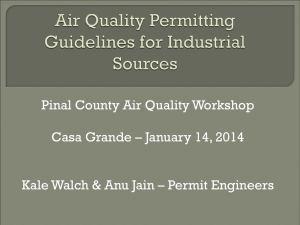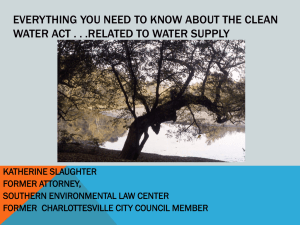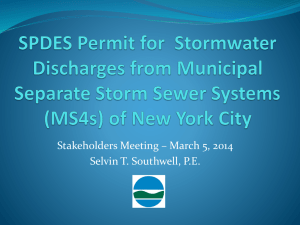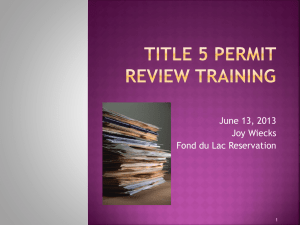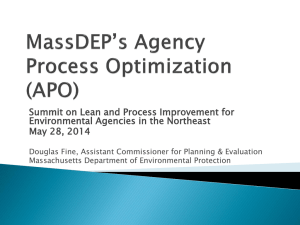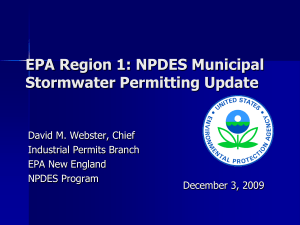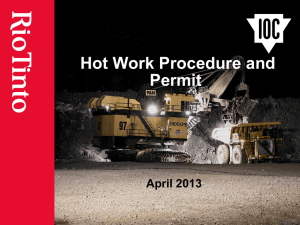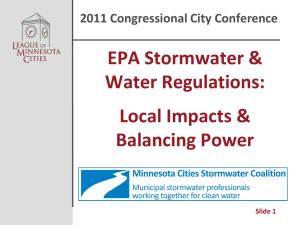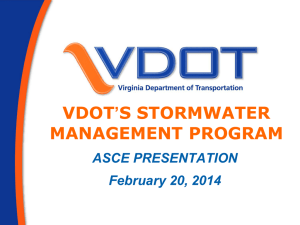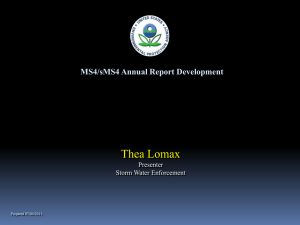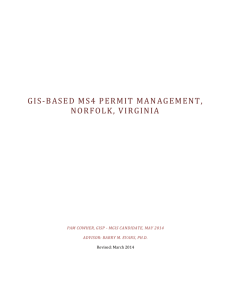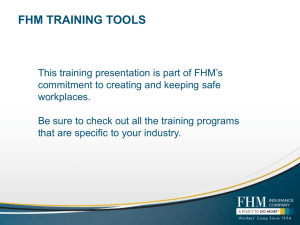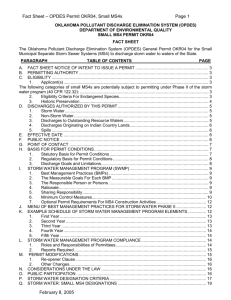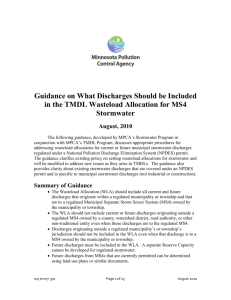MS4 TMDL Issues/Implementation - Louisiana Urban Stormwater
advertisement
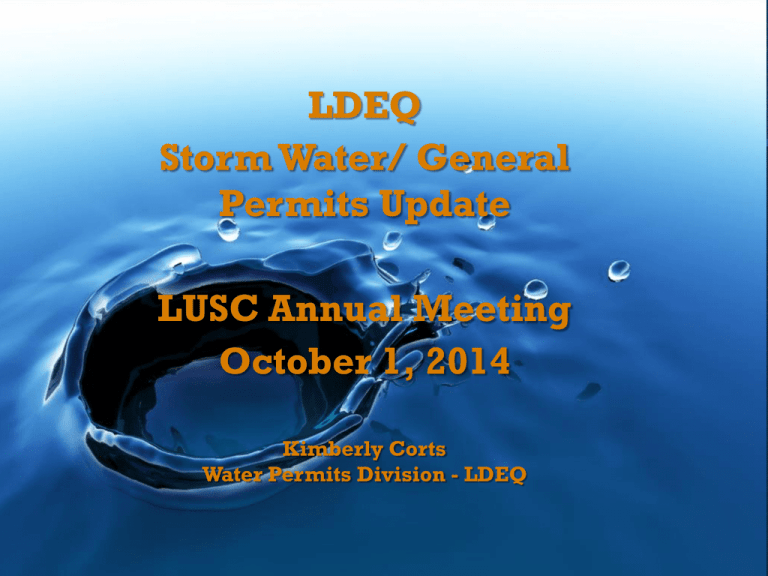
LDEQ Storm Water/ General Permits Update LUSC Annual Meeting October 1, 2014 Kimberly Corts Water Permits Division - LDEQ What’s New? Water Permits Division Structure Master General Permits Reissued/Pending Construction Effluent Limit Guidelines (ELGs) Ongoing TMDL Issues/Implementation WPD -Current Org Structure Administrator (Scott Guilliams) General and Industrial Permits Municipal, Biosolids and Water Quality Major and Minor Industrials Major and Minor Municipals, Biosolids and Pretreatment General Permits, Major MS4s, and Biomonitoring Water Quality and Date Evaluation and Assessment Master Generals Reissued Class IV Sanitary General Permit (LAG570000) – Effective 6/11/2014 Exterior Vehicle Wash General Permit (LAG750000) – Effective 3/15/2014 Cement, Concrete and Asphalt General Permit (LAG110000) – Effective 4/4/2014 Automotive Repair/Auto Dealerships (LAG470000) – Effective 9/1/2014 Large Construction General Permit (LAR100000) – Effective 10/1/2014 Master Generals Pending O&G Territorial Seas General Permit (LAG260000) – Under EPA Review Discharges from Sand & Gravel Mining Operations (LAG490000) – Under EPQ Review Discharges from Dewatering Petroleum Tanks, Beds & Excavations (LAG300000) – Under EPA Review Discharges from Potable Water Treatment Facilities (LAG380000) – Under EPA Review Class III Sanitary General Permit (LAG560000) – Final permit is pending MS4 Relationship to Master Generals 11, 000+ Facilities and CSW Projects covered under LPDES Master General Permits Illicit Discharge Detection and Elimination (IDDE): Construction and Post-Construction Storm Water Management Major component of MS4 SWMPs! Permitted MS4s are partially responsible for ensuring facilities and projects within their jurisdiction have obtained the appropriate LPDES permits and are discharging in compliance with those permits Water Permitting Hierarchy EPA Clean Water Act/40 CFR (Federal Regulations); NPDES; Oversees State Programs LDEQ Delegated to implement NPDES program (LPDES); Must comply with NPDES regulations MS4s Permitted through the LPDES Program; Develops and enforces local ordinances; Ensures compliance with LPDES requirements Challenges for Permit Renewals EPA’s Pending eReporting Rule o Language requiring e-NOI use and netDMR use has been added to all permits upon reissuance (once these tools are available) o Minimum data elements (MDEs) for thousands of facilities covered under general permits must be entered/updated prior to being reauthorized Revision of Storm Water ELGs (March 2014): o More detailed and stringent reviews by EPA o Addressing TMDLs in storm water LAG75 (Exterior Vehicle Wash) Non-compliant discharges often issues for MS4s Requires the use of low-surfactant and low phosphate soaps Now covers portable pressure washing operations for buildings, parking lots, etc. LAR100000 – Large Construction GP Activities disturbing 5 acres or greater OR smaller areas that are part of a larger common plan (e.g. subdivisions, airports, retail developments) MUST obtain coverage under the permit by submitting a complete and correct Notice of Intent (NOI). The new permit is effective TODAY! LAR100000 – Large Construction GP As part of the construction storm water construction management component of an MS4s SWMP, municipalities should at a minimum ensure all qualifying construction projects in their jurisdiction obtain and comply with this permit. MS4s should: Require a copy of the NOI prior to issuing a building permit Review the SWPPP Ensure operators are complying with the permit during inspections Utilize LDEQ’s inspection forms, SWPPP templates Have LDEQ’s Small Business Assistance information handy! LAR100000 Changes Incorporates new ELGs, which includes a requirement for buffer zones for projects adjacent to a water of the state No minimum for unimpaired waters, but a buffer zone must be present (recommend 30 ft.) 50 ft minimum for impaired waters and ONRWs Buffer zones are required unless infeasible due to urban site constraints, construction of water features, etc. Alternatives to buffer zones should be utilized to protect the receiving stream LAR100000 Changes Prohibited non-storm water discharges: Washout from stucco, paint, oils, curing, or other compounds Soaps or solvents used in vehicle and equipment washing Specific prohibitions on non-storm water discharges without a control: Concrete washout Utilize outlet structures that draw water from the surface of impoundments LAR100000 Changes More specific stabilization and erosion control requirements o Stabilization shall be initiated immediately where earth disturbing activities have permanently ceased o Use of temporary vegetative and non-vegetative stabilization when temporarily ceased > 14 days o Minimize sediment discharge from the site, control volume during peak flow to minimize peak flow LAR100000 Changes The annual maintenance and surveillance fee(s) must be submitted with the NOI in accordance with the following time frames: $264.00 – 0 months – 1 year $528.00 – 2 years $792.00 – 3 years $1056.00 – 4 years $1320.00 – 5 years Authorization letters will include the expiration date. If a continuation of coverage under this permit is needed beyond the selected number of years, permittees must submit a Notice of Extension 30 days before the expiration date of your permit. LAR100000 Changes NEW Notices of Intent MUST be used; older versions will not be accepted No Notices of Termination are required Permit coverage will automatically end based on the pre-selected date Eliminates annual invoices based on fiscal year MS4s must be aware of changes to ensure operators in their jurisdiction comply with submitting Notices of Extension, when needed LAR100000 Changes New Permit, NOI, and Frequently Asked Questions Document are on: http://www.deq.louisiana.gov/portal/Default.aspx?tabid=245 MS4 TMDL Issues/Implementation Phase I and Phase II: Pollution Reduction Plans Adopt the WLA as a measurable goal Aggregated/Disaggregated WLAs addressed in Phase I permits only; most Louisiana TMDLs assign disaggregated WLAs Select and implement SCMs that specifically address pollutants of concern Identify other measurable goals, where applicable Update SWMP within six months of TMDL approval Include a schedule for implementation of SCMs Track effectiveness of SCMs and modify, as necessary MS4 TMDL Issues/Implementation MS4s in the Lake Pontchartrain Basin are required to incorporate targeted control mechanisms to address TMDLs. Fecal Coliform WLAs (Disaggregated): Baton Rouge, Baker, LSU, Central, Ascension, Livingston Parish, Denham Springs, Walker, Hammond, Slidell, Jefferson Parish, Harahan, Kenner, Port of Orleans, City of New Orleans Dissolved Oxygen (Disaggregated): Livingston, Walker, Denham Springs, Hammond, Mandeville, St. Tammany, Slidell SOD, Ammonia, Phosphorus (Aggregated): City of New Orleans, Orleans Levee District, LADOTD, SWBNO MS4 TMDL Issues/Implementation Phase I Monitoring: Semi-annual grab samples at all representative outfalls draining basins which discharge to a stream for which the TMDL is applicable More specific monitoring are not required due to dry/wet weather screening and standard monitoring requirements already included in all Phase I permits Phase II Monitoring: Must be done to track the effectiveness of SCMs Monitoring design to be determined by permittee(s) Monitoring design may include dry/wet weather visual screenings, laboratory analyses, or a combination of both Use of third party data allowed and encouraged MS4 TMDL Issues/Implementation By end of permit cycle (2018), permittees should have some data on effectiveness and water quality improvement. SOD TMDL Issues: SOD calculated, but TMDL not specific as to how No analytical method for measuring SOD, but EPA requires permittees to monitor for WLA parameters Proposed alternative monitoring parameters, but EPA wants a translator to SOD Model inputs were DO, chlorophyll a, phosphorus, nitrogen, and temperature MS4 TMDL Issues/Implementation Recommended controls included in permits: POTWs/Collection Systems: Couple compliance orders with MS4 pollutant reductions Develop a plan for regionalization of unsewered areas Require upgrade of failing septic systems Include public education measures specifically targeted at fertilizer use and pet waste Construction: require minimum buffer zones MS4 TMDL Issues/Implementation Examples of Controls sMS4s have implemented: Identified clusters of un-sewered areas and developing long-range plans for regionalization (St. Tammany Parish) Retrofitting storm water retention ponds with additional BMPs (St. Tammany Parish) Require copies of LDEQ permits prior to issuing certificate of occupancy, authorizing electricity, or issuing building permit (Tangipahoa Parish, Zachary) Conduct surveys of home STPs in areas impaired for fecal coliform (Tangipahoa Parish in conjunction with the Lake Pontchartrain Basin Foundation) MS4 Audits/Inspections EPA conducted several audits, two of which resulted in administrative orders LDEQ has conducted 17 inspections in FY 2014 Most common findings: Most LDEQ inspections focus on public participation and construction storm water elements no available SWMP not conducting Construction SW inspections SW outfalls not designated or identified Annual Reports not submitted
